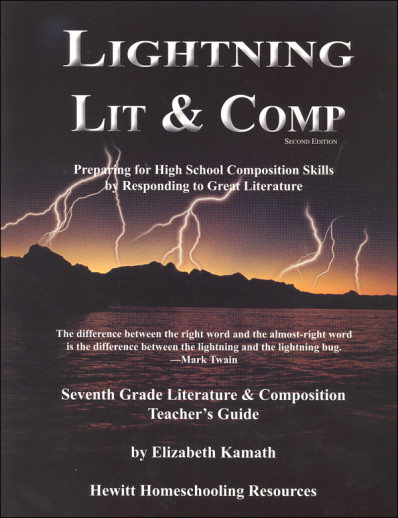We use cookies to make your experience better. To comply with the new e-Privacy directive, we need to ask for your consent to set the cookies. Learn more.
Lightning Lit & Comp Seventh Grade Teacher's Guide
The Teacher Guide provides answers, schedules, teaching/grading tips, rubrics, project suggestions/checklists, and grade-tracking records.
There are required literature resources to use with each course. While you may be able to locate some or all of the books at a library, we also offer the Grade 7 Pack that include the necessary books plus the student and teacher books.
Grade 7 literature selections include: All Creatures Great & Small, Adventures of Tom Sawyer, Alice's Adventure in Wonderland, Helen Keller: The Story of My Life, and Stories and Poems for Extremely Intelligent Children of All Ages.
The Teacher's Guide includes the explanation of the course's philosophy, a weekly lesson planner, answers to the comprehension questions and the workbook pages, additional teaching suggestions for the lessons, and additional information on the writing exercises.
In each course, there are 36 weekly lessons grouped into chapters. There are eight chapters in Grade 7; one for each of the major pieces of literature that are studied throughout the year plus some on short stories and one on poetry, but the chapters do not necessarily correspond to a specific time period. For instance, in the 7th grade course, Chapter 5 is covered in two weeks, Chapter 6 in four weeks, Chapter 7 in two weeks, and Chapter 8 in nine weeks. There is a consistent pattern in the chapter contents, however: Introduction (to the literary work), While You Read (what to look for), Vocabulary List, Comprehension Questions, Literary Lesson, Mini-Lesson (writing lesson), and Writing Exercises.
There are 8-12 exercises per chapter, in seven different coded types - L for literary lessons, M relating to mini-lessons, C practicing composition skills, T for thinking skill pages, G exercises that review grammar and mechanics, P for puzzles, and E for extra-challenge (the last two being the optional ones). There's a nice variety in these exercises and a well-thought-out relationship between the literary and composition activities. Frankly, I like the step-by-step skill building that is integral to the course.
The Student Guide includes instructional text, shorter works (i.e. poetry, excerpts), author background, discussion questions (comprehension, thought, literary), and writing exercises. The Student Workbook provides workpages practice the skills and concepts learned in the lessons, along with composition skills (writing from note cards, rewriting in your own words, etc.), thinking skills (e.g., differentiating fact from opinion, identifying bias), and grammar review (e.g., capitalization, pronouns and antecedents). There are also optional puzzles and extra "Challenge" workbook pages. The Teacher Guide provides answers, schedules, teaching/grading tips, rubrics, project suggestions/checklists, and grade-tracking records.
There are required literature resources to use with each course. While you may be able to locate some or all of the books at a library, we also offer the Grade 7 Pack that include the necessary books plus the student and teacher books.
Grade 7 literature selections include: All Creatures Great & Small, Adventures of Tom Sawyer, Alice's Adventure in Wonderland, Helen Keller: The Story of My Life, and Stories and Poems for Extremely Intelligent Children of All Ages.


I wanted a reading curriculum to complement our writing curriculum. A reading curriculum was hard to find.
My oldest used Lightning Lit for 8th grade. I was pleased with the instruction, the reading selections and the ease of use. I am using Lightning Lit 7 with my younger and plan to use 8 with her next year.